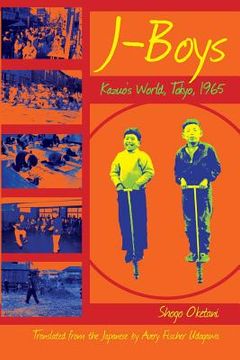Synopsis "J-Boys: Kazuo's World, Tokyo, 1965 (in English)"
In Japan, preparations for the coming Tokyo Olympics are underway, and adults wax nostalgic about the first Tokyo Olympics in 1964, as well as the economic boom years of the 1960s. The younger generation is curious about the first Olympics and how things changed in Japan then. What was it like to be a child at that time, and why should we care now? "J-Boys, Kazuo's World, Tokyo, 1965" follows the adventures of a third-grade student named Kazuo and his friends. Obsessed with U.S. sprinter Bob Hayes, American TV shows, and tasting a "real" American hamburger, Kazuo also bathes in public baths, buys tofu for his family, and looks forward to flying New Year's kites. As he grows, he observes the lingering effects of World War II on his changing world.As you read "J-Boys," you'll see Kazuo train to race like Hayes, help his brother Yasuo check on a stray dog, guess the school lunch menu, worry about grades, and spend time with friends. You'll see him toss beans for the Setsubun holiday, meet a yakuza, and get nervous about girls. You'll discover stories about his parents, who were children when Japan was at war. In one chapter, Kazuo meets a bereaved woman who lost her son in a battle. In another, he ponders Japan's actions against Korea, which lead to school bullying. And Kazuo wonders about the smog that fills the Tokyo sky as Japan grows, and about how TV has eclipsed the local movie theater that showed Godzilla. He even finds out about foreign places-home of Christmas, the Beatles, Popeye the Sailor and the Vietnam War. As you explore Kazuo's world of Tokyo in the mid-1960s, you may find it different than-or surprisingly similar to-your own.Set in West Ito, a fictional working-class district of downtown Tokyo, the stories in "J-Boys" illuminate various aspects of daily life early in the period of postwar economic growth, including a widespread fascination with Western culture among youth and the economic and psychological repercussions of World War II. "J-Boys" tells the story of one boy's coming of age, while introducing topics including aspects of traditional Japan, the influence of U.S. culture, daily life in the 1960s, and social concerns such as migrant workers and bullying. Weighty topics (urban expansion, the effects of war) balance with lighter ones (rock and roll, school lunches) to create a book that interests readers while inciting curiosity about social issues and how things will change with the next Olympics in 2020.Praise for "J-Boys, Kazuo's World, Tokyo, 1965""Created with great affection and skill." --Donald Richie"A fascinating and endearing work."--Graham Salisbury, author of "Under the Blood-Red Sun," winner of the Scott O'Dell Award for Historical Fiction "J-Boys attains something akin to sublime joy. It joins the ranks of classics like Marjorie Rawling's "The Yearling" and John Steinbeck's "The Red Pony. "--Peter Tieryas Liu, author of "The United States of Japan" and "Mecha Samurai Empire""A historical lesson for readers of all ages."--JQ Magazine"A sushi plate of delicious morsels."--Margi Preus, author of "The Heart of a Samurai""Deep and lasting insights."--Holly Thompsonm author of "Orchards""Deftly explores the inevitability of change and the search for identity."- Nichibei Weekly"With a kind of "Stand by Me" feel, "J-Boys" perfectly captures universal concerns of fitting in and growing up."-Kids' Home Library"Adult readers will find Kazuo's mid-1960s world a valuable key to the mystery of the Tokyo we know today."--Kyoto Journal"An anecdote-rich meditation on the past." --The Japan Times

